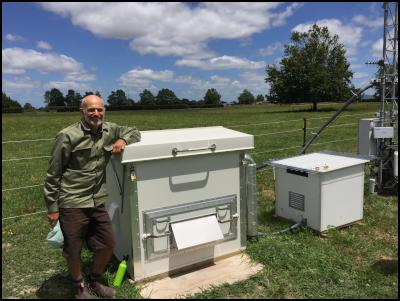Waikato obtains European Union Horizon 2020 ERA-GAS funding

Caption: Associate Professor David Campbell beside the new GHG measurement system near Waharoa.
University of Waikato researchers, led by Associate Professor David Campbell, have been successful in obtaining funding under the European Union's Horizon 2020 ERA-GAS funding (Monitoring & Mitigation of Greenhouse Gases from Agri- and Silvi-Culture), as part of the international PEATWISE consortium.
PEATWISE partners include research organisations and universities from Norway, Finland, Sweden, The Netherlands and Denmark. Research will focus on improving national greenhouse gas (GHG) inventories and mitigating emissions utilising good farm management practices. The New Zealand funding (€300K - NZ$483K - over three years) will be contracted to the Ministry of Primary Industries and starts in July.
“An exciting aspect of this new funding is the expansion of our team’s agricultural GHG research programme into drained peat soils,” says Dr Campbell.
WaiBER research group, headed by Dr Campbell and Professor Louis Schipper, has been evaluating GHG mitigation methods on dairy farms on mineral soils for several years.
Peat soils, while making up a small percentage of New Zealand soil types, make a disproportionately large contribution to soil CO2 emissions. Dr Campbell’s past research has estimated around seven tonnes of carbon dioxide for every hectare per year.
While most of New Zealand’s methane emissions come from animals, very wet soils can also release this powerful warming gas (around 25 times the warming effect of CO2). Relatively little is known about rates of N2O emissions from New Zealand peat soils, and how these are affected by drainage management.
N2O has around 300 times the warming effect of CO2. The two main areas of farmed peat soils are in the Waikato and Southland. These soil types are usually found in colder regions (hence the interest from Northern Europe) but New Zealand is much warmer and can therefore potentially expand global understanding for GHG emissions from peat soils in a warming climate. It is hoped that the new research will identify peat farming practices that will lead to reduced GHG emissions while maintaining or improving farm production.
This success in a strong internationally competitive environment reflects the University’s strategic investment in building capacity, particularly in the eddy covariance system that can take measurements simultaneously from an agricultural setting of all three gases of interest: carbon dioxide nitrous oxide and methane. In Years 1 and 2, CO2 fluxes will be continuously measured at paired sites on farms with differing management practices (grazing, water table, nutrient and effluent management). Research will also determine the effect of lime incorporation and cultivation on annual CO2 emissions. Researchers hope to work closely with Waikato Regional Council on aspects of the project.
ENDS


 ASB Polyfest: Polyfest’s 50th Celebrations On Track Despite Funding Cuts
ASB Polyfest: Polyfest’s 50th Celebrations On Track Despite Funding Cuts Air New Zealand: Raw Thrills - Air New Zealand's Most Popular Inflight Entertainment Revealed
Air New Zealand: Raw Thrills - Air New Zealand's Most Popular Inflight Entertainment Revealed Hustle Management: Celebrating 50 Years Of Music, Now And Then, With Mark Williams
Hustle Management: Celebrating 50 Years Of Music, Now And Then, With Mark Williams Massey University: Birdnapped Cockatoo Wins Quote Of The Year
Massey University: Birdnapped Cockatoo Wins Quote Of The Year LAWA: “Know Before You Go” – Check Summer Swimming Water Quality Online
LAWA: “Know Before You Go” – Check Summer Swimming Water Quality Online Official Aotearoa Music Charts: 2024 End Of Year Charts Have Been Published
Official Aotearoa Music Charts: 2024 End Of Year Charts Have Been Published